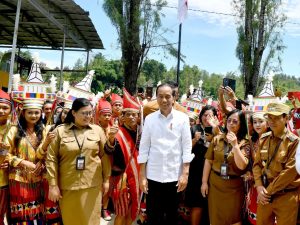Indonesia President Joko “Jokowi” Widodo and his eldest son are no longer members of the country’s ruling party due to their support for a rival candidate at this year’s presidential election, a party official said yesterday.
Jokowi ran under the banner of the Indonesian Democratic Party of Struggle (PDI-P) during his successful runs at the presidency in 2014 and 2019, but did not endorse the PDI-P’s presidential candidate, Ganjar Pranowo, ahead of the February 14 polls. Instead, he expressed veiled support for his defense minister, Prabowo Subianto, who went on to win a decisive victory, clinching more than 58 percent of the vote.
Komarudin Watubun, the head of the ethics division of the Indonesian Democratic Party of Struggle (PDI-P), told a number of media outlets yesterday that Jokowi and his son Gibran Rakabuming Raka, Prabowo’s vice presidential running-mate, ceased to be members of the party the moment that they declined to endorse Ganjar. He clarified that the two had not been expelled from the party, but “they are no longer members because they decided to be on the opposing side,” Komarudin told BenarNews.
Ganjar performed poorly in the presidential election, winning less than 17 percent of the vote, despite the PDI-P winning the largest number of seats in the concurrent election to the House of Representatives. The third presidential candidate, former Jakarta Governor Anies Baswedan, won just under 25 percent of the vote.
While Jokowi never formally endorsed Prabowo, his lack of support for Ganjar, and preference for the man that he bested in both 2014 and 2019, was pretty clear. The appointment of his son in late October as the former general’s vice-presidential running-mate was widely viewed as a final confirmation of his preference, and many critics accused Jokowi of using the powers of office to bring the candidacy about.
Gibran was only able to join Prabowo’s ticket after a controversial Constitutional Court ruling that created an exception to the minimum age requirement of 40 (Gibran is currently 36). This decision was presided over by none other than Jokowi’s brother-in-law, who was later forced to resign as the Court’s chief justice for the “serious” violation of professional ethics.
Critics, including both of the losing candidates, have also accused Jokowi of putting his thumb on the scale for Prabowo in other ways. Anies and Ganjar filed similar petitions to this effect to the Constitutional Court, claiming that Prabowo’s victory had been enabled by fraud and widespread state interference, including the handouts of rice, cash and fertilizer by the Jokowi administration. The court this week dismissed both of the candidates’ complaints.
It would be surprising if Jokowi, who joined the PDI-P nomination in 2004 ahead of his successful run for the mayoralty of the city of Surakarta in Central Java, expected to remain a member of the party beyond the election. Jokowi’s backing of Prabowo was both cause and effect of a growing estrangement between him and the PDIP’s key powerbroker, Megawati Sukarnoputri, who served as president during 2001-2004, as the former political outsider’s ambitions waxed and began to outgrow the party that had nurtured him.
By formalizing the divorce between Jokowi and the PDI-P, the party’s announcement raises the question of the still-popular leader’s future plans. His support of Prabowo, and the elevation of his two sons into political roles, were widely viewed as an attempt to secure a lasting influence and forge a path independent of the PDI-P. But exactly how he intends to do this after he steps down in October has remained unclear.
According to a report by Reuters, which cited several sources with knowledge of Jokowi’s thinking, the still-popular leader intends to take over Golkar, the second-largest party in the House of Representatives. Reuters argued that this “could see him retain sizable influence and potentially counterbalance that of old rival Prabowo when he takes office in October.”

































